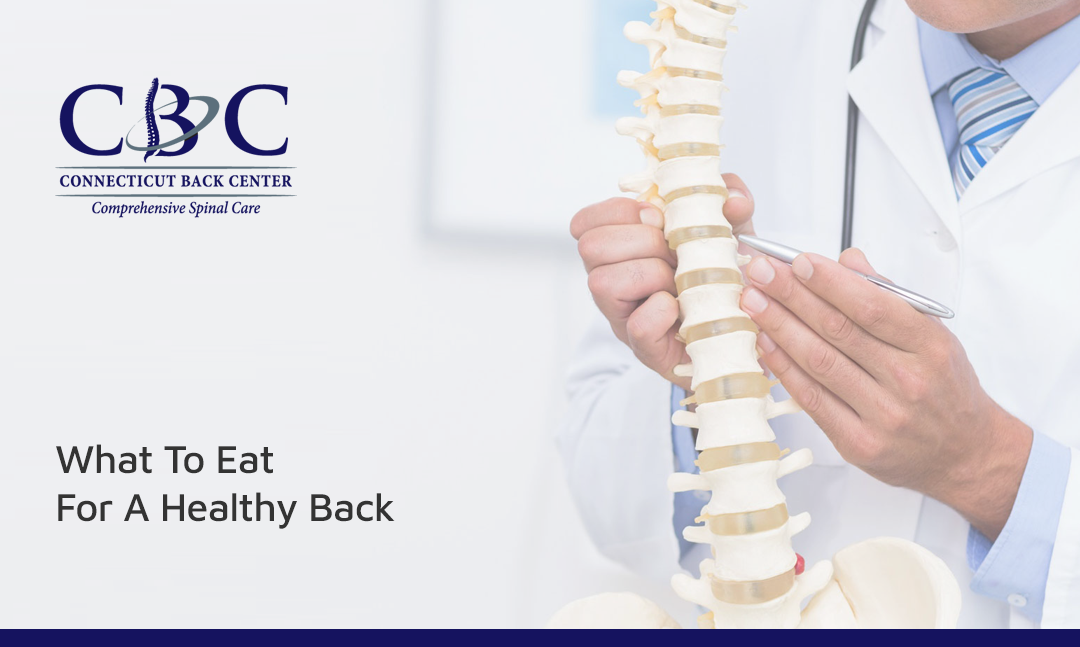At Connecticut Back Center we often talk about the importance of cardiovascular exercise and strengthening to maintain healthy bones, and to prevent injuries to the back and throughout the body. What we eat affects our health in many ways, What about eating for a healthy back?
Springtime is finally here, and before long, gardens large and small will flourish with fresh vegetables, and the mouth-watering smell of backyard barbeques will fill the air of neighborhoods everywhere. Before you prepare your next cookout menu check out some tips about eating for a healthy back.
The below article What You Eat May Help Beat Back Pain originally appeared on everydayhealth.com.
Could what you eat be contributing to your back pain? Maybe. Many foods have been shown to reduce (or increase) inflammation, a known cause for back pain. So when you have back pain, changing your diet may help you avoid it.
“Left unchecked, inflammation will run rampant through your body, causing all kinds of problems, including low-back pain,” says Michael Perry, MD, chief medical director and co-founder of Laser Spine Institute, which has seven surgical centers across the country. That’s why creating an anti-inflammatory diet with foods that help you maintain good nutrition is important to managing back pain.
If you’re prone to back pain, consider these diet tips:
Eat Your Veggies to Fight Back Pain
A mostly plant-based diet that includes such things as flax and chia seeds, is probably your best bet to avoid inflammation, especially when eaten in combination with omega-3-rich coldwater fish like salmon, mackerel, sardines, herring, black cod, tuna, and trout.
“Deeply colored fruits and vegetables are a key part of an anti-inflammatory diet,” says Dana Greene, MS, RD, LDN, a nutritionist in Brookline, Massachusetts. If you’re looking for foods that reduce back pain and are loaded with nutrition, try carrots, beets, sweet potatoes, cherries, berries, grapes and red wine, pomegranate, and watermelon, she says. Herbs and spices, including basil, cinnamon, ginger, rosemary, garlic, curcumin, onions, oregano, and turmeric tend to be especially rich in anti-inflammatory agents, so season generously. Also, drink healthy herb teas and true teas (green, oolong, and white).
Dr. Perry adds that olive oil, green tea, and brightly colored fruits and vegetables have all been shown to reduce inflammation in cartilage in the spinal column, which helps to control back pain and stiffness. When eating vegetables, think the greener the better, he says. Kale, spinach, and broccoli are all list-toppers for an anti-inflammatory diet with back-pain-fighting properties.
Other good food choices for an anti-pain diet: avocados; nuts (walnuts, almonds, pecans, and Brazil nuts); lean proteins, such as chicken and turkey; beans; and cocoa.
Avoid These Foods to Reduce Pain
Robin Barrie Kaiden, RD, CDN, a registered dietitian at Robin Barrie Nutrition in New York City, says that some people avoid nightshade vegetables (tomatoes, eggplant, white potatoes, and peppers) as part of an anti-inflammatory diet. “No research supports this, however,” she says. “To find out if these vegetables contribute to inflammation in your body, don’t eat them for two weeks and see if your symptoms disappear — just like you should do with any other potentially sensitive food.” Always talk to your doctor or a registered dietitian when making changes to your diet.
Other foods to avoid? Processed foods, fast foods, and saturated fats. All of these fuel inflammation. This includes white bread, pasta, rice, sugary drinks and snacks, fried foods, and anything with partially hydrogenated oil in the ingredients, often found in preservative-packed products with a long shelf-life, such as chips, crackers, and pastries. (Opt for poly- or monounsaturated oils, such as canola or olive oil, when cooking.). Stay away from caffeine and alcohol as well, Perry says.
The Calcium Factor
Another way to keep back pain at bay is to make sure you’re getting enough of the right nutrients, such as calcium and vitamin D. Bone is the body’s storage reservoir for calcium. “As you age, it is hard to maintain bone mass, which can lead to such conditions as osteopenia or osteoporosis,” Perry says. “These diseases can weaken the vertebrae in your spine. Calcium contributes to bone mass, helping you avoid those conditions.”
A 2010 report from the Institute of Medicine (IOM) gave new guidelines for daily calcium supplementation. These definitions are commonly referred to as the recommended daily allowance. According to the IOM, you shouldn’t consume more than 2,000 milligrams of calcium a day (either through foods or supplements), says Kenneth Hansraj, MD, chief of spine surgery at New York Spine Surgery and Rehabilitation Medicine in Poughkeepsie, New York.
“Gone are the days when more is better,” Dr. Hansraj says. Studies show that if you take a high dose of calcium supplements, you increase your risk for heart problems and atherosclerosis, which involves plaque forming in your arteries. Consuming too much calcium can also cause bone fractures.
Calcium should come from natural sources, Hansraj says. Natural food sources for calcium include yogurt, milk, and cheese, as well as leafy green vegetables. If you’re not able to obtain enough calcium from your diet, then talk to your doctor about whether supplements are right for you. Teens, for instance, require 1,300 mg of calcium a day and older people about 1,000 mg daily, he says, but “do not supplement more than 500 mg a day.” Instead, Hansraj suggests trying to get more calcium from your diet.
Nick Shamie, MD, an associate professor of spine surgery at UCLA in Los Angeles and a spokesperson for the American Academy of Orthopaedic Surgeons, adds a word of caution: When fractures occur, just using calcium supplements is not enough. “Consult an orthopedic surgeon and musculoskeletal specialist to devise a complete medical plan to deal with your condition,” Dr. Shamie says. “This regimen may include medications, such as bisphosphonates that help build bone, and regular exercise.”
If you are one of the many people suffering from neck pain, chronic lower back pain, scoliosis, sciatica or another spine-related condition, you will be in great hands at Connecticut Back Center (CBC). CBC was founded by Jesse Eisler, MD, PhD, in 2005 and with offices in Vernon and Bloomfield, CT serves the Greater Hartford and Central Connecticut area. Our mission is to provide accurate, responsive and effective spinal care with comprehensive non-surgical and surgical treatments for the full spectrum of spinal disorders. Our goal is always to reduce your pain, increase your flexibility and help you resume an active life after treatment. To learn more about your treatment options, give us a call at (860) 872-6229 or request an appointment online now.

